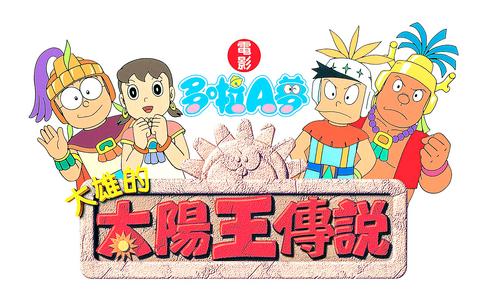In the Time Asia poll of Asian Heroes for 2002, he came out equal with Jackie Chan (
Doraemon is part of the childhoods of many Taiwanese now in their 20s and 30s, and despite the simplistic drawing style, which looks eons behind the phantasmagoria of Hollywood animation, retains its appeal for a new generation of children. The film hit the top of the box office for summer holiday screenings in Japan and Hong Kong and looks poised to do equally good business if the buzz on Internet sites is anything to go by -- and the postings are not being made by children either.

PHOTO: UIP
For those not in the know, Doraemon was born on Sept. 3, 2112, is 129.3cm tall, has a waist measurement of 129.3cm and weighs 129.3kg. He has a magic pouch in his stomach where all kinds of futuristic devices are stored. The only problem is that most of these devices don't work very well. Obviously anyone who has problems programming the VCR will sympathize with this character. His best friend is Nobita, a young knucklehead constantly being bullied by his classmates.
Like most of the great children's stories, wherever they might derive from, there is a story behind the story of the two-man team that made up Fujiko Fujio, the front man for the cartoon. While the early stories were set in suburban Japan, Doraemon is setting out on bigger and better adventures suited to the big screen.
In Doraemon, Nobita and the Legend of the Sun King the two main characters go through a "hole in time" and find themselves in a Mayan kingdom where there is intrigue over the royal succession, giving Doraemon the chance to utilize favorite devices such as the takekoputa (a rotor worn on the head, one of the truly inspired Doraemon merchandizing products) and the dokodemo door, which allows Nobita and Doraemon to go anywhere they want. This bigger setting doesn't seem to have affected the essential simplicity of the story and the attractiveness of the characters.
The perennial appeal of this character, according to Pico Iyer, travel writer and social commentator, is attributable to Doraemon's perennial optimism that undermines the dark images of a technological future. The doings of Doraemon and Nobita, because of their klutzy ineptitude, comfort us in the face of an overwhelming complexity of modern living, and so Doraemon takes his place among a pantheon of characters such as Winnie the Pooh, Peter Pan and Scooby Doo, whom people never completely grow out of.
For those who don't mind the press of weekend crowds of school children, Doraemon, Nobita and the Legend of the Sun King is probably as good a window into the Asian psyche as you are likely to find in the cinemas this summer.

The canonical shot of an East Asian city is a night skyline studded with towering apartment and office buildings, bright with neon and plastic signage, a landscape of energy and modernity. Another classic image is the same city seen from above, in which identical apartment towers march across the city, spilling out over nearby geography, like stylized soldiers colonizing new territory in a board game. Densely populated dynamic conurbations of money, technological innovation and convenience, it is hard to see the cities of East Asia as what they truly are: necropolises. Why is this? The East Asian development model, with

June 16 to June 22 The following flyer appeared on the streets of Hsinchu on June 12, 1895: “Taipei has already fallen to the Japanese barbarians, who have brought great misery to our land and people. We heard that the Japanese occupiers will tax our gardens, our houses, our bodies, and even our chickens, dogs, cows and pigs. They wear their hair wild, carve their teeth, tattoo their foreheads, wear strange clothes and speak a strange language. How can we be ruled by such people?” Posted by civilian militia leader Wu Tang-hsing (吳湯興), it was a call to arms to retake

This is a deeply unsettling period in Taiwan. Uncertainties are everywhere while everyone waits for a small army of other shoes to drop on nearly every front. During challenging times, interesting political changes can happen, yet all three major political parties are beset with scandals, strife and self-inflicted wounds. As the ruling party, the Democratic Progressive Party (DPP) is held accountable for not only the challenges to the party, but also the nation. Taiwan is geopolitically and economically under threat. Domestically, the administration is under siege by the opposition-controlled legislature and growing discontent with what opponents characterize as arrogant, autocratic

When Lisa, 20, laces into her ultra-high heels for her shift at a strip club in Ukraine’s Kharkiv, she knows that aside from dancing, she will have to comfort traumatized soldiers. Since Russia’s 2022 invasion, exhausted troops are the main clientele of the Flash Dancers club in the center of the northeastern city, just 20 kilometers from Russian forces. For some customers, it provides an “escape” from the war, said Valerya Zavatska — a 25-year-old law graduate who runs the club with her mother, an ex-dancer. But many are not there just for the show. They “want to talk about what hurts,” she